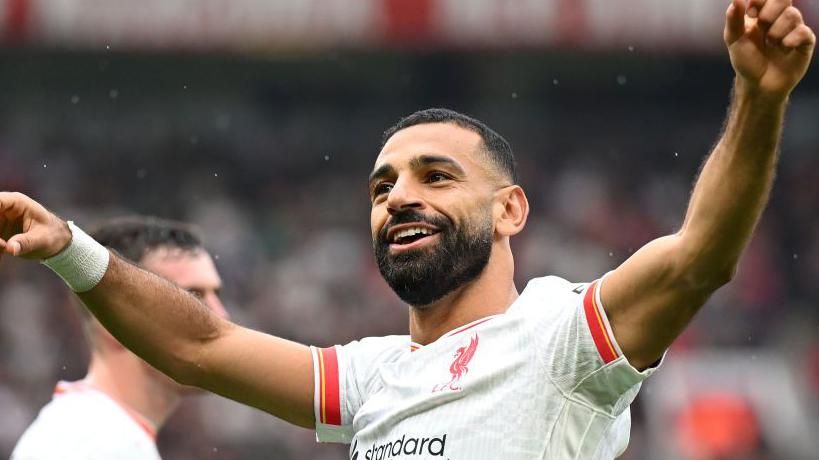ARTICLE AD BOX
 Image source, Getty Images
Image source, Getty Images
Liverpool's Mohamed Salah has benefited from no close-season international tournament for Egypt this summer
BBC Sport football news reporter
Erling Haaland and Mohamed Salah's brilliant early-season form illustrates why footballers must get proper rest periods, players' union chief Maheta Molango has said.
In their first three Premier League matches of the 2024-25 campaign, Manchester City striker Haaland has scored seven times and Liverpool forward Salah has three goals and three assists.
Neither player featured in post-season major tournaments and were highlighted as case studies by Professional Footballers' Association (PFA) chief executive Molango as a new player workload monitoring (PWM) report of 1,500 footballers by global union Fifpro was released on Thursday.
"There is a big difference between players who have holidays or not," Molango said. "One difference is from England in Haaland. He is back to the machine he was when he first joined us in England, similar to Mo Salah, he is the best version of Mo."
The latest research into ongoing concerns about a crowded global football calendar comes amid legal action against world governing body Fifa being taken by organisations including the PFA and Fifpro.
Molango says Fifpro has "red lines" on player welfare which are:
A maximum of between 50 and 60 matches per season, depending on a player's age.
A maximum of five or six weeks' worth of consecutive back-to-back matches - which are defined as two or more games in a single week.
A mandatory minimum off-season rest period of three weeks.
Molango added: "We need to protect the players from themselves. They love playing, because they are committed to playing... and they don't want to lose their starting spot.
"For us it's alarming when you hear [Real Madrid coach Carlo] Ancelotti saying 'I may need to give players time out during the season'. I, as a fan, pay 100% of a season ticket. I may end up in a situation where I don't see 100% cent of the show, I see a fraction of it."
Bellingham 'could play 1,200 career games' - what the report says
Fifpro's 59-page workload report says:
No English player has ever played more minutes by the age of 21 than Real Madrid midfielder Jude Bellingham (over 19,000 minutes).
Bellingham is projected by the study to play 1,224 matches over the duration of his career; surpassing the 1,002 played by Frank Lampard, the 895 matches played by Wayne Rooney and 839 played by David Beckham.
Manchester City and England's Phil Foden played 72 matches and Real Madrid and Uruguay's Federico Valverde played 71 matches for club and country last season.
That is projected to potentially be 77 for Foden and 79 for Valverde in 2024-25 with an extended Champions League and expanded Club World Cup; and in 2025-26 could be up to 83 (Foden) and 82 (Valverde) with a bigger World Cup in summer 2026.
Bayer Leverkusen midfielder Florian Wirtz has played 11,501 minutes by the age of 21, compared to the 4,175 played at that stage by German football great Michael Ballack.
Real Madrid and Brazil's Vinicius Jr has played 369 games by the age of 24 compared to 163 matches played by Brazil legend Ronaldinho at the same age.
Image source, Getty Images
Image caption,The report includes comments on the schedule from some of the game's biggest names, including Bellingham saying: "It's difficult on the body - mentally and physically you are exhausted."
The report listed the top 10 players with the highest match load, which takes into account matchday squad inclusions as well as appearances.
Julian Alvarez (83)
Phil Foden; Luis Diaz (77)
Rui Patricio (76)
Virgil van Dijk; Nikola Milenkovic, Ollie Watkins, Antonio Silva, Ruben Dias (74)
Darwin Nunez, Cody Gakpo, Saud Abdulhamid, Kyle Walker, Aaron Ramsdale (73)
Meanwhile, Tottenham and Argentina defender Cristian Romero tops the list of players with the most international travel in world football, with the report recording 163,000km across his trips last season. Nine of the top 10 players listed were South American.
The report also looked at days worked as an alternative measure to matches or minutes played.
It found that - including games, training, travel and other club duties such as media - footballers are having less than the internationally required one day a week off.
Some players in the report spent 88% of days in the workplace, according to the report.
However, players' working days at the training ground are shorter than other professions and many will only be in squads for games and not actually play.
Additional report findings from the 1,500 surveyed were:
54% of players have a 'high or excessive workload' - playing over 40 matches for club and country in a single season.
One in six (17%) made over 55 appearances. Almost a third (30%) of players endured sequences of at least six consecutive weeks of back-to-back games (two games or more per week).
Manchester United's Bruno Fernandes is one case study, playing more than 60 matches for each of the last five seasons.
85% of players believe they should not play more than six matches in a row, with more than half suggesting three in a row should be the upper limit.
88% of high performance coaches suggest 55 matches should be the upper limit of games played in a single season.
More than half (54%) of players surveyed said they have played injured, while 82% of coaches surveyed admitted to fielding players who they knew needed a rest, because of their need to achieve a result.
Molango said: "From the feedback of people who haven't had that rest, they looked shattered and tired. This season will be the defining season. This season doesn't make any sense."
Why is Fifa facing action?
There are two claims against Fifa, including the joint claim by English, French and Italian players' unions against workload issues in the football calendar, particularly after the emergence of a new Club World Cup format starting in 2025.
There is also a further complaint by Fifpro and European Leagues, about Fifa controlling the calendar and proposing competitions at the same time.
However, a CIES Football Observatory report, external on the match calendar and football workload stated that only 5% of all clubs have played 60 or more games in a season, not including friendlies, in the last 12 years.
Fifa president Gianni Infantino has previously defended his organisation, saying it organises "around 1% of the games of the top clubs in the world" and generates revenues to develop football "all over the world".
Fifa has also accused some European leagues of "hypocrisy" given their pre-season matches and travel.
It is also not planning to change its Club World Cup plans and wrote to Fifpro in May of this year regarding the ongoing dispute about consultation on football's calendar, saying it was acting in the "best interests of world football".

 2 months ago
10
2 months ago
10








 English (US)
English (US)